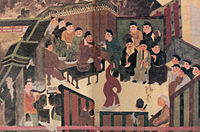Portal:Poetry
Welcome to the Poetry Portal


Poetry (a term derived from the Greek word poiesis, "making"), also called verse, is a form of literature that uses aesthetic and often rhythmic qualities of language − such as phonaesthetics, sound symbolism, and metre − to evoke meanings in addition to, or in place of, a prosaic ostensible meaning. A poem is a literary composition, written by a poet, using this principle.
Poetry has a long and varied history, evolving differentially across the globe. It dates back at least to prehistoric times with hunting poetry in Africa and to panegyric and elegiac court poetry of the empires of the Nile, Niger, and Volta River valleys. Some of the earliest written poetry in Africa occurs among the Pyramid Texts written during the 25th century BCE. The earliest surviving Western Asian epic poem, the Epic of Gilgamesh, was written in the Sumerian language.
Early poems in the Eurasian continent evolved from folk songs such as the Chinese Shijing as well as from religious hymns (the Sanskrit Rigveda, the Zoroastrian Gathas, the Hurrian songs, and the Hebrew Psalms); or from a need to retell oral epics, as with the Egyptian Story of Sinuhe, Indian epic poetry, and the Homeric epics, the Iliad and the Odyssey. (Full article...)
Selected article

Fu (Chinese: 賦), variously translated as rhapsody or poetic exposition, is a form of Chinese rhymed prose that was the dominant literary form during the Han dynasty. Fu are poetic pieces in which an object, feeling, or subject is described and rhapsodized in exhaustive detail and from as many angles as possible. Classical fu composers attempted to use as wide a vocabulary as they could, and often included great numbers of rare and archaic terms in their compositions. Fu poems employ alternating rhyme and prose, varying line length, close alliteration, onomatopoeia, loose parallelism, and extensive cataloging of their topics.
Unlike the songs of the Classic of Poetry (Shijing) or the Verses of Chu (Chu ci), fu were meant to be recited aloud or chanted but not sung. The fu genre came into being around the 2nd and 3rd centuries BC and continued to be regularly used into the Song dynasty. Fu were used as grand praises for the imperial courts, palaces, and cities, but were also used to write "fu on things", in which any place, object, or feeling was rhapsodized in exhaustive detail. The largest collections of historical fu are the Selections of Refined Literature (Wen xuan), the Book of Han (Han shu), the New Songs from the Jade Terrace (Yutai xinyong), and official dynastic histories.
There is no counterpart or similar form to the fu genre in Western literature. During a large part of the twentieth century, fu poetry was harshly criticized by Chinese scholars as excessively ornate, lacking in real emotion, and ambiguous in its moral messages. Because of these historical associations, scholarship on fu poetry in China almost ceased entirely between 1949 and the end of the Cultural Revolution in 1976. Since then, study of fu has gradually returned to its previous level. (Full article...)
Selected image
Poetry WikiProject

Selected biography

Rabindranath Tagore (Bengali pronunciation: [rəˈbindrəˈnɑt ˈtɑɡɔr] ), also written Rabīndranātha Thākura (pronounced [rəˈbindrəˈnɑtə ˈtɑkʊrə]), (7 May 1861 – 7 August 1941), sobriquet Gurudev, was a Bengali polymath who reshaped Bengali literature and music in the late 19th and early 20th centuries. Author of Gitanjali and its "profoundly sensitive, fresh and beautiful verse", he became the first non-European to win the Nobel Prize in Literature in 1913. In translation his poetry was viewed as spiritual and mercurial; however, his "elegant prose and magical poetry" remain largely unknown outside Bengal. Tagore introduced new prose and verse forms and the use of colloquial language into Bengali literature, thereby freeing it from traditional models based on classical Sanskrit. He was highly influential in introducing the best of Indian culture to the West and vice versa, and he is generally regarded as the outstanding creative artist of the modern Indian subcontinent, being highly commemorated in India and Bangladesh, as well as in Sri Lanka, Nepal and Pakistan. (Full article...)
Did you know (auto-generated) -

- ... that Peter Fallon, an Irish poet who translated Virgil's Georgics, also edited a 1970 beat-poetry magazine that featured works by John Lennon and Allen Ginsberg?
- ... that the Three Bards are the most celebrated poets in the history of Polish literature?
- ... that Minnesang poet Walther von Klingen is depicted jousting in the Codex Manesse manuscript?
- ... that scholars debate whether Anactoria, mentioned in Sappho's poems, was a real person, a pseudonym, or an invention of Sappho?
- ... that the UK's former chief immigration adjudicator, Judge Hubert Dunn, published a book on the Irish poet Francis Ledwidge, including some previously unseen poems?
- ... that north London's Barnet Gate was called Grendel's Gate by the Anglo-Saxons, after the monster slain in the epic poem Beowulf?
Selected poem
| Jabberwocky by Lewis Carroll |
|---|
|
'Twas brillig, and the slithy toves
Did gyre and gimble in the wabe; "Beware the Jabberwock, my son! He took his vorpal sword in hand: And as in uffish thought he stood, One, two! One, two! And through and through "And hast thou slain the Jabberwock? 'Twas brillig, and the slithy toves |
Related portals
Topics
Recognized content
Categories
Associated Wikimedia
The following Wikimedia Foundation sister projects provide more on this subject:
-
Commons
Free media repository -
Wikibooks
Free textbooks and manuals -
Wikidata
Free knowledge base -
Wikinews
Free-content news -
Wikiquote
Collection of quotations -
Wikisource
Free-content library -
Wikiversity
Free learning tools -
Wiktionary
Dictionary and thesaurus






















